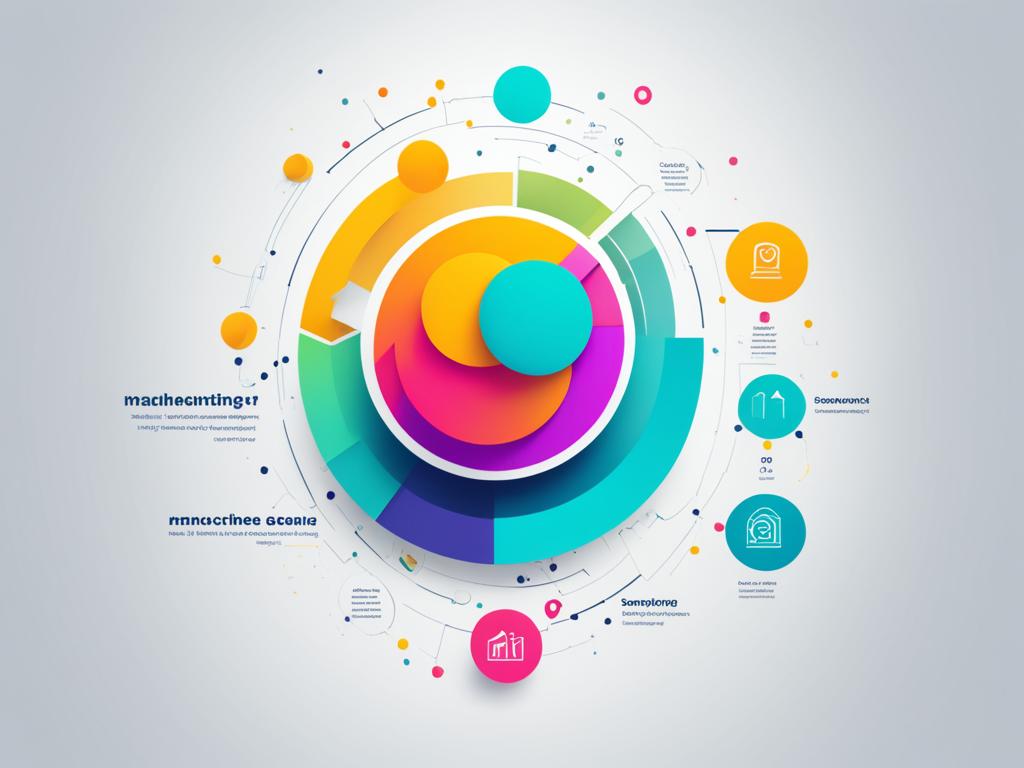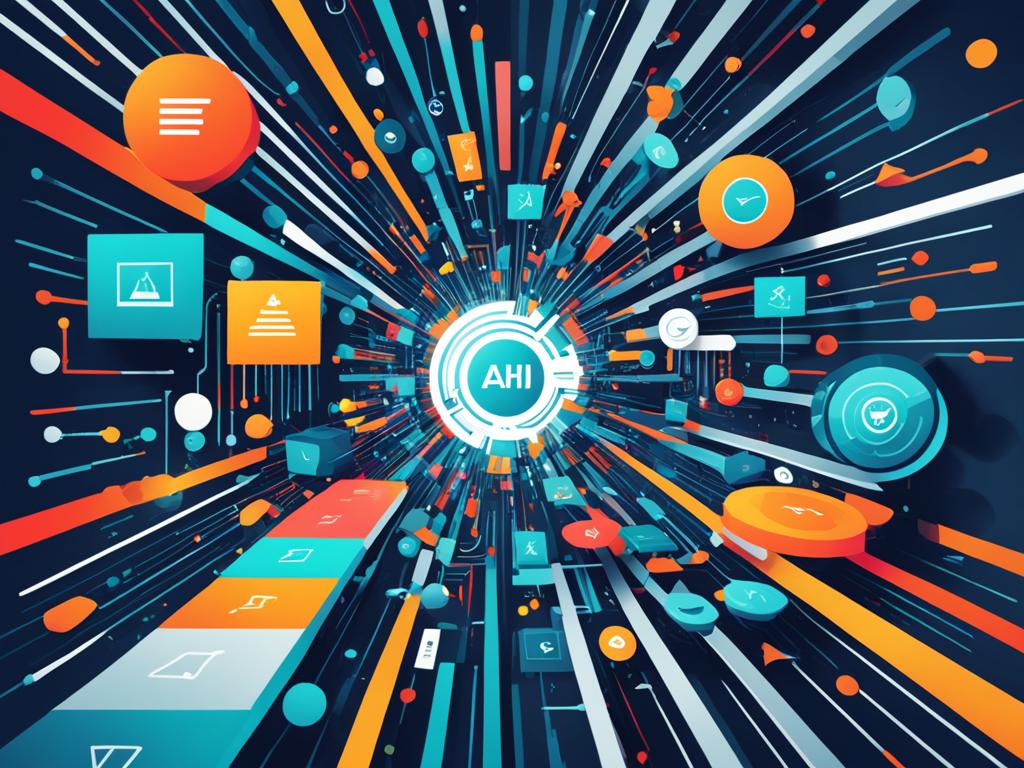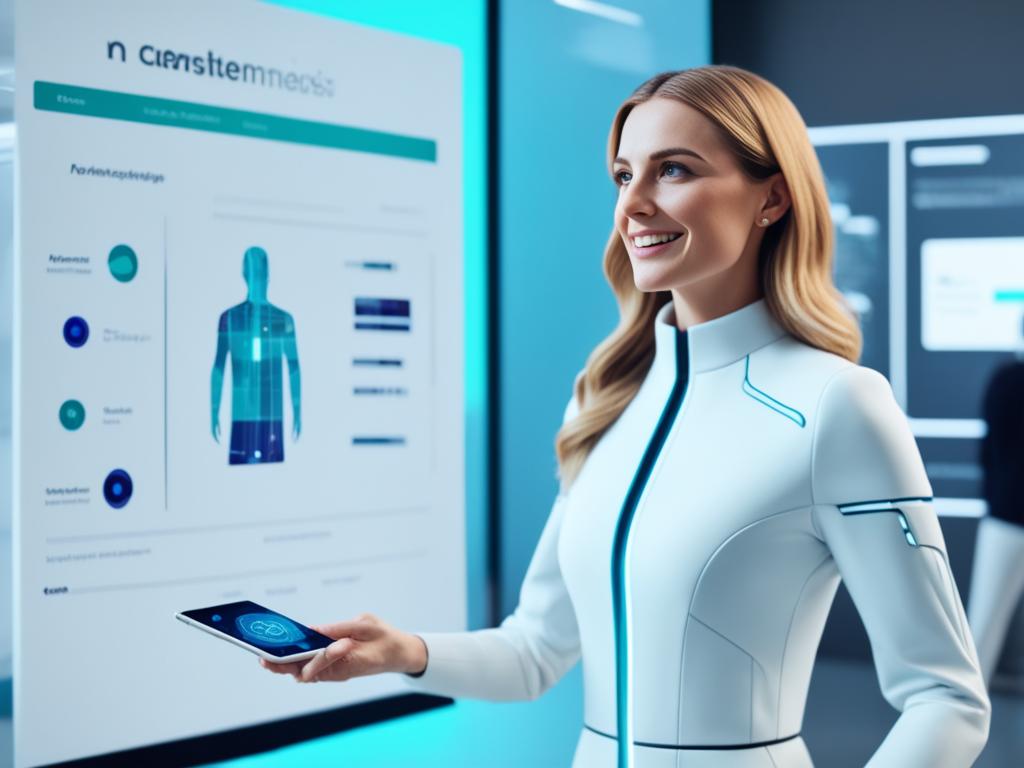Ever wondered why businesses seem to know what you want even before you do? It’s not luck—it’s marketing with artificial intelligence (AI). For any organization aiming to improve, understanding AI’s role in marketing is key. It helps streamline operations and improve customer experiences.
Why has AI become so important for marketers everywhere? We’re about to dive into that. AI helps in many ways, from understanding customer needs to creating content that engages. This sets the groundwork for exploring AI’s big impact on marketing tactics.
Key Takeaways
- AI in marketing is revolutionizing how businesses perceive and engage with customers.
- Enhanced customer experiences are a direct result of integrating AI technology into marketing strategies.
- Automation and data-driven decision-making are key benefits of using AI in marketing.
- AI’s applications range from predictive analytics to content creation and customer insights.
- Understanding AI’s role in marketing is essential for staying competitive in a digital landscape.
The Basics of AI in Digital Marketing
Artificial intelligence (AI) has changed digital marketing for the better. It lets companies look into lots of data, automate decisions, and hone their marketing efforts. This change has made things more efficient. It also gives us a closer look at what people want and how they act, changing how marketing grows.
Understanding AI and Its Applications
At the heart of it, AI in digital marketing means using smart tech to make better choices. We’re talking about machine learning, guessing what customers will do next, and understanding human speech. These help tailor messages to each person, predict what customers want, and do boring tasks quickly. For example, smart chatbots can answer questions fast. Meanwhile, systems that recommend products make suggestions based on what you’ve bought before.
The Evolution of Digital Marketing with AI
Digital marketing has grown a lot with AI’s help. In the beginning, it was all about doing tasks by hand and simple analysis tools. But as AI got better, it brought new tools like instant data study and smart marketing campaigns. Now, AI helps find patterns and trends we wouldn’t see on our own. This means we can aim our campaigns more carefully and make them work better.
This big change highlights how key AI is in digital marketing’s growth today. It’s a must-have for any business looking to stay ahead.
How Machine Learning Enhances Marketing Strategies
Modern marketing has changed thanks to machine learning. It’s more efficient and targeted now. Advanced data analytics help companies make smarter decisions. This improves all parts of their marketing.

Predictive Analytics in Marketing
Predictive analytics transforms marketing. It lets businesses predict trends and what consumers will do next. Thanks to machine learning, marketing can be more forward-thinking.
Netflix, for instance, uses it to suggest movies and shows people like. This leads to more people watching and enjoying their service.
Personalization with Machine Learning
Machine learning shines in making things personal. It looks at consumer data to create tailored experiences. This not only makes customers happier but also boosts sales.
Take Amazon as an example. Its engine suggests products by looking at what you’ve browsed or bought before. This makes shopping more relevant to you.
Customer Insights and Behavioral Analysis
Knowing what customers want is key for good marketing. Machine learning is great at understanding customer habits. It analyzes behavior to give businesses insights into what customers prefer and how they act.
This leads to marketing that hits the mark, keeping customers coming back. Spotify, for example, makes playlists based on what you like listening to. This gives you a more personal experience with their service.
AI Marketing Tools You Should Know About
In today’s digital marketing world, AI tools can boost your strategies and operations. Let’s explore key tools and see how they change your marketing game.
Chatbots and Virtual Assistants
Chatbots are key in AI marketing. They handle customer questions all day and night, offering speedy replies and enhancing satisfaction. These bots guide users in buying, suggest products, and solve common problems on their own.
Virtual assistants like Amazon Alexa and Google Assistant tackle more complex tasks. They connect with your CRM to automate personalized emails. These assistants play a crucial role in managing customer relationships and nurturing leads.
AI-Powered Content Creation Tools
Creating content takes lots of time and effort. AI tools like Copy.ai and Jarvis make it easier by crafting SEO-friendly content quickly. They use data and user preferences to produce engaging content for your audience.
These AI tools ensure your content keeps a consistent tone across different platforms. This means your brand voice is always clear. With these tools, you can spend more time planning than doing repetitive tasks.
Automated Email Marketing Solutions
Email marketing has changed with AI automation. Tools like Mailchimp and HubSpot segment your lists, personalize messages, and pick the best sending times. This leads to better open rates and more clicks.
AI makes your email campaigns more targeted and relevant, improving engagement and conversions. By understanding user behavior, these tools create content that really speaks to your audience’s needs and interests.
Check out these AI marketing tools compared:
| Tool | Key Feature | Benefit |
|---|---|---|
| Chatbots | 24/7 Customer Service | Improved Customer Engagement |
| Virtual Assistants | Task Automation | Efficient Workflow Management |
| AI Content Generators | SEO-Friendly Writing | Time and Resource Savings |
| Email Automation Tools | Personalized Campaigns | Higher Engagement Rates |
The Role of AI in Marketing Automation
Marketing automation is changing fast thanks to artificial intelligence. AI lets businesses make their workflows better and their marketing efforts more focused.

AI’s big win is improving customer segmentation. It uses smart algorithms and data analysis to find customer patterns and preferences. This lets marketers tailor experiences like never before.
AI also shines in handling repetitive tasks. It can send emails and manage social media posts automatically, doing these jobs with great precision. Marketers then have more time for tasks that need creativity and insight.
Let’s check out how AI boosts various parts of marketing automation:
| Aspect | Traditional Approach | AI-Enhanced Approach |
|---|---|---|
| Workflow Efficiency | Manual inter-department coordination | Automated task assignment and tracking |
| Customer Segmentation | Basic demographic and behavioral analysis | Advanced pattern recognition and preference analysis |
| Task Management | Human effort and time-intensive | AI-driven automation and precision |
Using AI in marketing makes things faster and more accurate, cutting down errors. AI efficiency means marketing is more unified and effective. This leads to stronger customer ties and greater profit.
Current AI Trends in Marketing
In the world of marketing, AI is changing the game. Companies use new tech to keep up. Here, we’ll look at the big trends making waves.
Voice Search Optimization
More people are using virtual helpers like Amazon’s Alexa and Google Assistant. So, making your content easy to find through voice searches is key. This move helps businesses get noticed more and reach more users.
Visual and Video Content Enhancement
AI is transforming visual and video content. It improves how images and videos look on different platforms. This leads to more people staying engaged. AI helps create unique, eye-catching videos and images that speak directly to viewers.
AI-Driven Social Media Marketing
AI has taken social media marketing to the next level. It looks at what users like and uses that info for better ads. This results in more interactions, improved sales, and connections that count.
| AI Trend | Benefits |
|---|---|
| Voice Search Optimization | Enhanced visibility, better accessibility, increased market capture |
| Visual and Video Content Enhancement | Improved engagement, high-quality visuals, personalized content |
| AI-Driven Social Media Marketing | Precise targeting, increased ROI, deeper customer connections |
Marketing, Artificial Intelligence, Overview
Artificial intelligence is changing the marketing field. It brings benefits and challenges. This includes everything from the initial setup to future goals. AI is reshaping how we think about marketing.
Implementation Challenges and Solutions
Getting AI into marketing poses challenges. Smaller businesses might find the cost of AI technology high. Also, fitting AI into current systems can create issues that need solving.
Handling data is another big challenge. AI needs lots of data to work well. So, companies must have good ways to gather and store data. They also need to ensure the data they use is clean and relevant.
It’s key to understand the rules about data use, like GDPR, for smooth AI use.
Yet, there are ways to overcome these challenges. Start small and slowly add more AI to control costs. Working with AI experts can solve system issues. Investing in better data handling and knowing the laws makes moving to AI easier.
The Future of AI in Marketing
The outlook for AI in marketing is bright. Seeing more AI in predictive analytics is one up-and-coming trend. This will let marketers predict what customers will do more accurately. It means marketing can be more focused and effective.
AI is also improving customer experiences. It lets companies offer unique experiences by understanding what each person likes. This can make customers more loyal and happy.
AI will also take over routine tasks in the future. This gives people more time for big-picture work. As AI grows, it will bring new chances for innovation and doing things better.
| Challenges | Solutions |
|---|---|
| High initial investment | Phased integration and cost management |
| Compatibility issues | Partnering with experienced AI vendors |
| Data management complexities | Investment in robust data systems |
| Regulatory compliance | Staying informed on data privacy laws |
Success Stories of AI-Driven Marketing Campaigns
AI-driven marketing campaigns are making big waves in many industries today. By using new AI technology, companies are making their strategies much better. This leads to great returns on their investments.
Netflix is a great example of AI success. It uses AI to suggest shows and movies that you might like. This makes users stick around more and lowers the number who leave.
Sephora’s AI chatbot, Sephora Virtual Artist, lets customers try makeup on digitally. This cool idea has increased their online sales and made customers happier.
In the car world, BMW is also winning with AI. It uses smart chatbots on its website to help customers directly. This helps people find what they need faster, improving sales and loyalty.
| Brand | AI Application | Outcome |
|---|---|---|
| Netflix | Personalized Content Recommendations | Increased User Engagement, Reduced Churn Rates |
| Sephora | Virtual Makeup Artist | Higher Online Sales, Improved Customer Satisfaction |
| BMW | Intelligent Chatbots | Higher Conversion Rates, Enhanced Customer Loyalty |
These stories show how AI is changing marketing for the better. By using AI, companies are seeing big improvements. They create more personal and effective campaigns that truly speak to customers.
Impact of AI on Consumer Behavior
Artificial intelligence (AI) has changed how we buy and think. It lets businesses predict what customers want with great accuracy. This leads to experiences that feel personal and build stronger bonds.
Understanding Consumer Preferences
Businesses use complex algorithms and data tools to learn what customers like. AI quickly goes through tons of data to find trends that humans might miss. This helps businesses offer things that really interest their customers, meeting their needs better.
AI and Purchase Decisions
AI’s role in what we decide to buy is huge. For example, recommendation engines suggest products we might like based on what we’ve bought or looked at before. This affects our choices a lot. Amazon enhances shopping experiences this way, boosting sales and customer happiness.
Building Customer Loyalty with AI
AI loyalty programs are changing how businesses keep customers. These programs look at shopping habits to suggest future buys and offer tailored rewards. This way, businesses can meet or even beat customer expectations, creating strong loyalty.
Ethical Considerations in AI Marketing
Talking about ethical AI in marketing means understanding its impact on privacy and data safety. As AI tools improve, marketers must keep their work clear and focused on the user.
The big worry in AI marketing ethics is how data can be wrongly used. Now, companies have to guard customer data more carefully than ever.
Mark Zuckerberg said it well: „In the world of AI and digital marketing, maintaining the integrity and security of user data isn’t just a necessity, it’s a responsibility.“
Being open about AI use is key. Users should know how their information is used. The ethics of AI look at the issues and possible misuses of this technology.
| Aspect | Concerns | Solutions |
|---|---|---|
| Privacy | Unauthorized data access | Robust encryption and policies |
| Transparency | Unclear data usage | Clear privacy notices |
| Consent | Lack of explicit permission | Opt-in data collection |
| Bias Prevention | Algorithmic bias | Diverse data inputs |
The conversation on AI marketing ethics is key for building trust and success. By dealing with these ethics, marketers can use AI in ways that respect and protect the rights of consumers.
Conclusion
We have seen how AI changes marketing throughout this article. It makes understanding customers better and automates content creation. This helps businesses greatly. AI uses data and predictions to give customers what they want, building great relationships.
AI fits smoothly into many marketing tools. Chatbots help customers instantly, and AI tools help with search engine ranking. Algorithms make social media work better. These technologies save time and boost the success of campaigns.
The future of marketing with AI looks bright. As AI grows, it offers more ways to be creative and reach customers in new ways. Marketers should use AI wisely and keep things clear to gain trust. Those who use AI well will lead the way in marketing.
